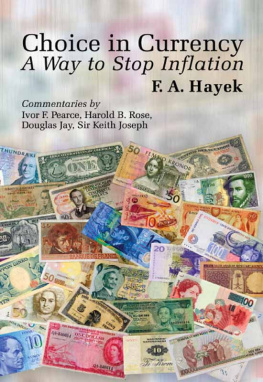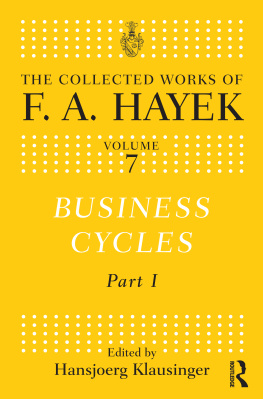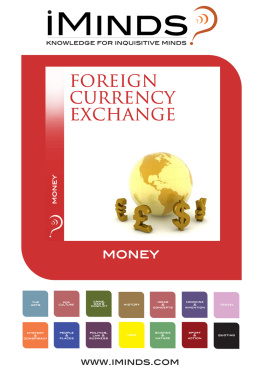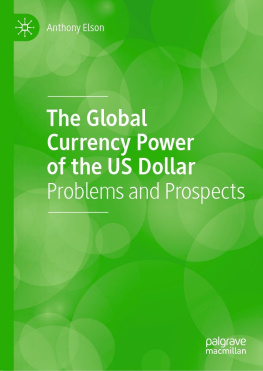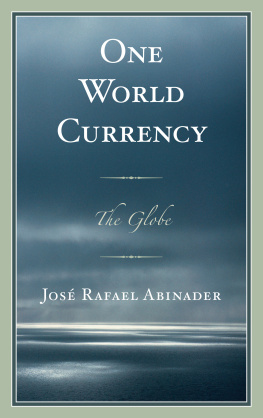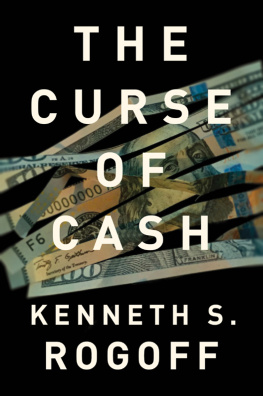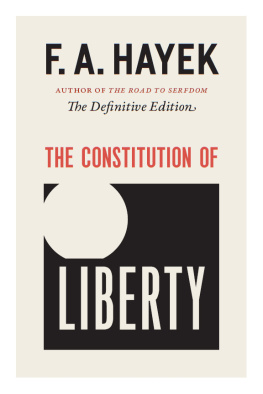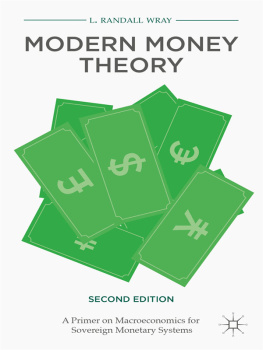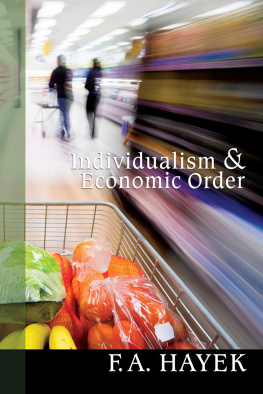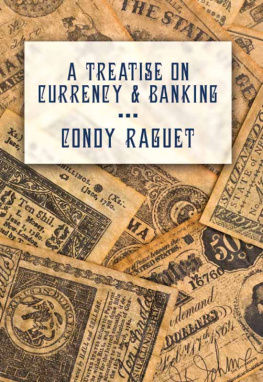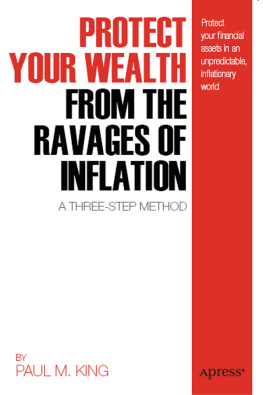INSTITUTE OF ECONOMIC AFFAIRS
The Institute was formed in 1957 as a research and educational trust that specializes in the study of markets and pricing systems as technical devices for registering preferences and apportioning resources. Micro-economic analysis forms the kernel of economics and is relevant and illuminating in both public and private sectors, in collectivist as well as in individualist societies. Where the macroeconomic method is used its results are verified and interpreted in the light of micro-economic significance.
The Institutes work is assisted by an advisory council which includes:
| Professor Armen A. Alchian | Professor E. Victor Morgan |
| Professor J. M. Buchanan | Professor Alan T. Peacock |
| Colin Clark | G. J. Ponsonby |
| Professor R. H. Coase | Professor A. R. Prest |
| Professor R. F. Henderson | Professor H. B. Rose |
| Professor T. W. Hutchison | George Schwartz |
| Graham Hutton | Henry Smith |
| Professor Harry G. Johnson | Professor A. A. Walters |
| Professor Dennis Lees | Professor Jack Wiseman |
| Professor B. S. Yamey |
The Institute is a company limited by guarantee, controlled by Managing Trustees. It is independent of any political party or group, and financed by sales of publications and by voluntary contributions from individuals, organizations and companies.
| General Director | Ralph Harris |
| Editorial Director | Arthur Seldon |
| Deputy Director | John B. Wood |
| Assistant to Directors | Publications Manager |
| Joan Culverwell | Michael Solly |
Librarian
Kenneth Smith |
THE INSTITUTE OF ECONOMIC AFFAIRS
2 Lord North Street, Westminster, London, SWIP 3LB
Telephone: 020 7799 8900
Choice in Currency
A WAY TO STOP INFLATION
F. A. HAYEK
Nobel Laureate 1974
with Commentaries by
IVOR F. PEARCE HAROLD B. ROSE
DOUGLAS JAY SIR KEITH JOSEPH
Published by,
THE INSTITUTE OF ECONOMIC AFFAIRS
1976
Republished in cooperation with
The Ludwig von Mises Institute
2009

First published February 1976 by
THE INSTITUTE OF ECONOMIC AFFAIRS
@ The Institute of Economic Affairs 1976
All rights reserved
SBN 255 36078-9
Contents
Preface
THE Occasional Papers are intended to make essays or addresses, of outstanding importance, accessible to a wider readership than that to which they were originally addressed. The 47 so far have included Papers by some of Britains, and the worlds, leading economists but also some important Papers by less well-known names.
No. 48 is an edited version of an address by Professor F. A. Hayek to a conference in Switzerland. In a sense it is a sequel to Occasional Paper 45, in which Professor Hayek argued that the cause of unemployment was not inadequate demand, arising from inadequate total income, but disproportions in relative wages required to equate the demand for labour and its supply in each sector of the economy. The error of supposing that full employment, high output and prosperity could be maintained by enlarging total money expenditure is described in this Paper as an age-old superstition to which Keynes and his followers have given the sanction of scientific authority.
In this Paper Professor Hayek considers the conditions under which it is possible for government to enlarge total expenditure by increasing the quantity of money. He argues that history indicates that, sooner or later, the control of the supply of money by government has ended in inflation. Hence the development of national and international monetary systems based on gold and other devices designed to remove from government the powers it invariably abused.
The opposite view, argued strongly in recent years in Britain, is that, if government was released from rigid mechanical rules in domestic or overseas monetary management, such as fixed exchange rates, it would be better able to act for the general good. This expectation, it is now evident, has not been realised because, although the rules were reasonably clear, government has found them politically tempting to break in practice. This is not a theoretical doubt whether government can improve on an automatic or semi-automatic monetary system, such as a gold or gold-exchange standard, in which the supply and value of money is beyond domestic political control. It is a practical judgement in political economy that a government subject to electoral pressures will not be able to observe the rules if to do so brings transitionary dislocation and unemployment.
Professor Hayek therefore argues that the time may have come to remove from government the power to require its citizens to use the money under its control. And in the last resort this would require that government be deprived of the power to define legal tender. The requirement is not to deprive government of the power to issue money but to deny it the exclusive right to do so and to force the citizenry to use it at the price it specifies. It is thus the government monopoly of money that is objectionable, and history is full of examples of governments that have attempted to enforce their power by extreme measures, including the ultimate sanction of death.
The solution is therefore to allow people to use the money they find most convenient, whether the money issued by their own government or by other governments. Professor Hayek argues that this system would be more desirable and practicable than a utopian European Monetary Unit.
This proposal, Professor Hayek recognises, may seem farfetched after centuries in which it has been considered that one of the proper, or essential, functions of government is to provide a currency on which the citizens could depend as a reliable unit of account and means of exchange, a function which has included the concept of legal tender. Professor Hayek denies that legal tender is an essential part of the monetary function of government. He argues that people should be free to refuse money they distrust in favour of money in which they have confidence. It is this new power of the people to refuse the national money that would induce national governments to ensure that their money was stable in value. Hence Professor Hayek argues the case for a new kind of international money.
In this Occasional Paper Professor Hayek has provided stimulating analysis of a contemporary problem and emerged with a radical solution. He considers ways in which the system might work in practice, and replies to objections to it. He discusses the effects it will have on banking systems, and in so doing he provides a commentary on the current debate on money and inflation and on the desired national and international institutions. Here it will come as no surprise to learn that he believes an international monetary authority is hardly to be trusted more than a national authority: he would confine government to a framework of legal roles in which the people could develop the monetary institutions that best suit them.
To indicate the possibly varying views on the importance and the practicality of Professor Hayeks proposals we invited comments from two economists and two senior politicians who have held high government office. The economists are Professor Ivor Pearce and Professor Harold Rose. Both politicians, Mr Douglas Jay and Sir Keith Joseph, are Fellows of All Souls College, Oxford, and are especially interested in economic affairs.

